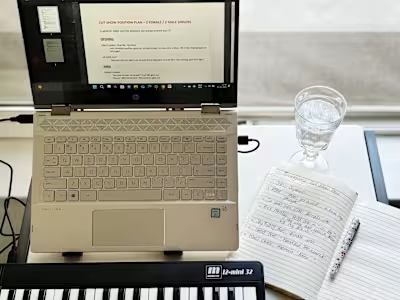European Theatre Tour Experience
In 2019, just out of school, I landed my first professional theatre role as the principal soloist in a three-month musical tour through Germany, Austria, and Switzerland. I was thrilled but also incredibly anxious—despite exceptional training at Fontys School of Performing Arts in the Netherlands, where I learned from Europe’s best teachers. Now, though, this was the real deal: I was getting paid, and the pressure was on.
Knowing our rehearsal period would be extremely short, I prepared intensely in the weeks leading up to it. With a double track to cover, I learned double the lines, mastered my singing parts, and practiced all my German-language moderations—no small feat since I wasn’t fluent at the time.
When I say our rehearsal period was short, I mean five days to internalize a full two-hour show. We learned solos, harmonies, choreography, staging, improvisational cues, and all possible show variations in case we would not have a full cast —work that typically takes four to six weeks. By opening night, I was mentally drained and didn’t feel ready at all. But there was no option to back out; with a sold-out audience and my name on the program, I took a deep breath while waiting for my entrance in the wings, trusted my training, embraced the moment—and delivered a flawless performance (don’t worry, I made plenty of mistakes later on during the tour, which kept me on my toes).
With the tour officially launched, I was ready to explore new cities, sing on big stages, and feel the audience’s energy. However, I’d completely romanticized tour life. Performing every night was a dream coming true, but the constant travel—4-5 hours daily—combined with late nights and early mornings was draining. After a few weeks, I realized I needed to conserve energy to maintain performance quality.
I began analyzing which parts of the show demanded the most energy, physically, vocally, and mentally, and wrote down each one. With limited breaks during the show, I barely had time to take a sip of water, let alone pause to reflect. But now that I was aware of my peak energy points, I developed strategies to manage them. I adjusted challenging vocal parts to sound powerful without overexertion, coached myself through nerve-wracking scenes by catching the negative self-talk and reframe my mindset, and focused on breath support for numbers that required both singing and dancing. Though the adjustments took time, they ultimately created a more sustainable routine, benefiting both me and the audience.
Another key strategy that helped me stay calm before each show was familiarizing myself with every new venue. Since we never performed in the same theater twice, the backstage layout, entrance routes, and even stage dimensions changed every night, often affecting how much room we had to move. I made it a habit to take a quick tour of the backstage area, mapping out the path from my dressing room to the stage, calculating the time needed for quick changes, and noting how fast I’d have to sprint from one wing to the other to make each entrance. One of my favorite rituals was to stroll through the empty audience area, taking in the view of the stage from their perspective, which gave me a sense of familiarity and ease before stepping into the spotlight.
Over time, I also learned that no two audiences are alike, and that their response wasn’t necessarily a reflection of my performance. Each night, a unique blend of factors—cultural differences (like for example how East Germans vary from South Germans), age, and group dynamics—shaped the audience’s reactions. Initially, I absorbed their energy, allowing their mood to influence my own. This was thrilling when they were lively and supportive, but it became exhausting when they were more reserved or introverted, which had a big influence on my self-esteem.
One night, after an especially exhausting show, I vented my frustration to a seasoned colleague who had "seen it all" over his long career. He was always unshaken, seemingly unaffected by the demands of the job or the reactions of the audience. Desperately, I asked him what his secret was. His answer changed my perspective: “My job is to give my all on stage, to perform with honesty and pure intention, no matter how the audience responds. Their reaction belongs to them. My responsibility is simply to create an experience worth watching and leave everything on that stage, without letting their shifting expectations hold me back.”
But does this mean we have no influence over the audience’s reaction at all? Absolutely not! There are powerful techniques to capture—and, just as crucially, sustain—their attention. As long as you remember that it’s impossible to control every response, it’s definitely worth (and fun!) working toward creating that connection that draws them in and keeps them engaged.
As I completed this whirlwind of a tour, I found myself having learned so much in just three months—skills that would stay with me throughout everything that followed. I became more skilled, balanced, and mature in my approach to performance and life in general. It wasn’t just about mastering the technical aspects of theatre, but about learning how to navigate challenges with confidence, energy, and grace. These lessons—about managing energy, dealing with varied audiences, and adjusting to unexpected circumstances—have shaped the way I approach not only performing but also speaking in any public setting. With time, I learned to not just survive, but thrive, and I carry these lessons with me in every new opportunity that comes my way.
Like this project
Posted Nov 7, 2024
My insights from touring Europe as a singer and actress, highlighting the challenges faced, skills acquired, and the boost in my stage confidence.
Likes
0
Views
3



